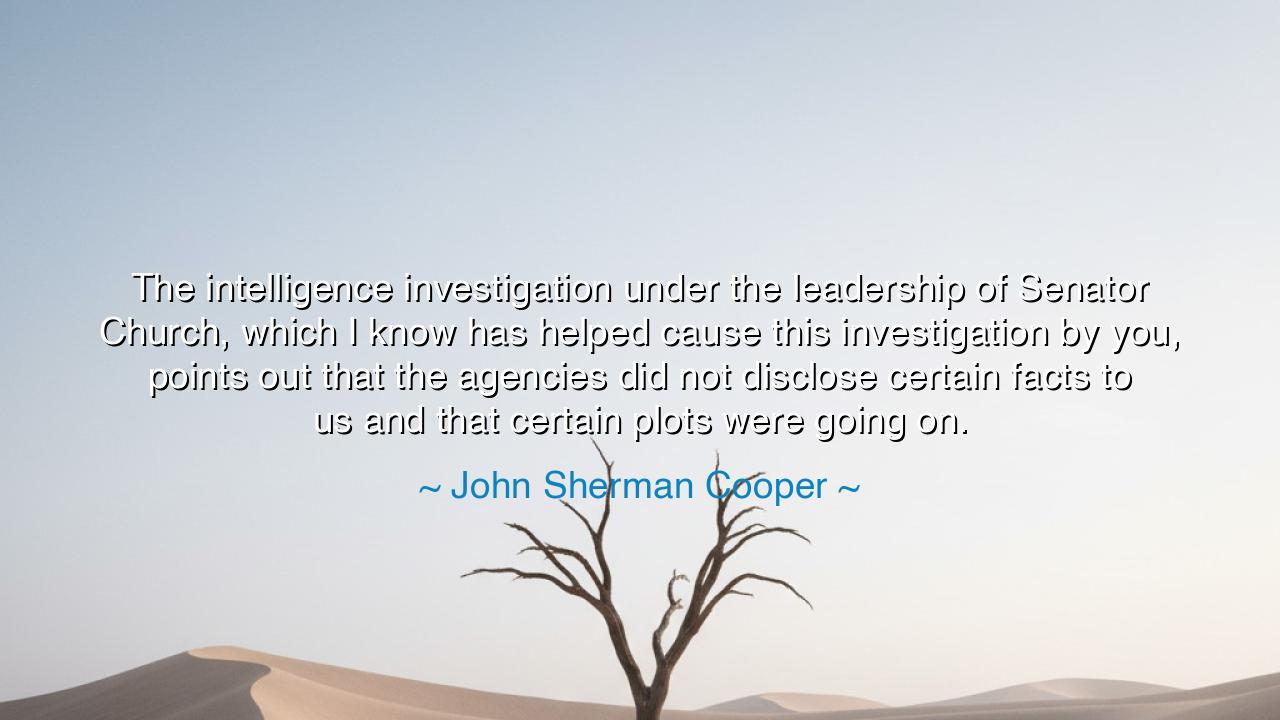
The intelligence investigation under the leadership of Senator
The intelligence investigation under the leadership of Senator Church, which I know has helped cause this investigation by you, points out that the agencies did not disclose certain facts to us and that certain plots were going on.






When John Sherman Cooper declared, “The intelligence investigation under the leadership of Senator Church, which I know has helped cause this investigation by you, points out that the agencies did not disclose certain facts to us and that certain plots were going on,” he spoke as a man standing at the threshold between truth and power, a place where the conscience of a democracy is tested. His words, though calm and measured, carry the weight of revelation and disappointment. They remind us that even in the highest halls of government, truth is fragile, and that the pursuit of transparency is a sacred duty—one that must be renewed by every generation.
The origin of this quote lies in one of the most turbulent and revelatory periods in American political history—the Church Committee hearings of the 1970s. Led by Senator Frank Church, this Senate investigation sought to uncover the secret activities of U.S. intelligence agencies—the CIA, FBI, NSA, and others—whose operations had, for years, unfolded beyond the gaze of the public and even of Congress itself. These investigations revealed covert plots, political assassinations, and abuses of power that had crept like shadows beneath the shining face of democracy. When Cooper, himself a senator and a man of integrity, reflected upon these revelations, he was not merely discussing hidden facts—he was lamenting the corruption of trust between the governed and those who govern.
In the ancient world, philosophers understood that power without accountability leads to ruin. Plato, in his Republic, warned that those who wield authority without wisdom will inevitably turn their strength against the very people they were meant to serve. Cooper’s words echo that ancient truth: that even the most noble institutions may falter when secrecy replaces honesty, and when the guardians of freedom begin to act without the consent of the free. His observation that “certain plots were going on” is not merely a historical note—it is a warning whispered through time, reminding us that vigilance is the price of liberty.
Consider, too, the lessons of ancient Rome. When the Republic grew vast and powerful, its leaders built secret networks of spies and informants to secure their rule. The Senate, once a body of open debate, became ensnared in intrigue. Julius Caesar, once hailed as a savior, used information gathered in secret to rise to power—and with that rise, the Republic fell into the hands of empire. What Cooper saw in the modern age was not new—it was the same cycle of power and concealment, repeated in the modern tongue. He understood, as the ancients did, that a free people must forever guard against the seduction of secrecy cloaked as security.
Yet Cooper’s tone is not one of bitterness—it is one of resolve. He speaks as a guardian of democratic virtue, acknowledging the failure of institutions while urging renewal. His acknowledgment that “the agencies did not disclose certain facts to us” is an act of moral courage, for it confronts the uncomfortable truth that even those sworn to protect the nation can become entangled in the darkness they seek to fight. By bringing such matters into the light, he and his fellow senators performed an act of purification—the cleansing of government through truth. This, too, is an ancient act: for in every age, from the temples of Greece to the courts of England, renewal begins only when truth is spoken aloud.
From this history, we learn a timeless lesson: power must always answer to truth, and truth must never bow to power. Institutions may serve the people, but without transparency and accountability, they become their masters. Just as the Church Committee once pulled back the veil on hidden abuses, so must every citizen remain awake, questioning, and brave enough to demand honesty from those in command. Silence is the ally of corruption; speech, the instrument of freedom.
Therefore, let the words of John Sherman Cooper stand as a warning and a guide. In times of deception, choose truth. In times of fear, choose courage. The wise ruler does not hide behind secrecy, but governs in the light; the wise citizen does not accept ignorance as safety, but seeks knowledge as liberation. For the survival of any republic—ancient or modern—depends not on the might of its armies or the reach of its spies, but on the moral strength of its people to demand truth, even from their own protectors.
Thus, as the ancients would say: “Let truth be your shield, and integrity your crown.” Only then can a people remain free.






AAdministratorAdministrator
Welcome, honored guests. Please leave a comment, we will respond soon